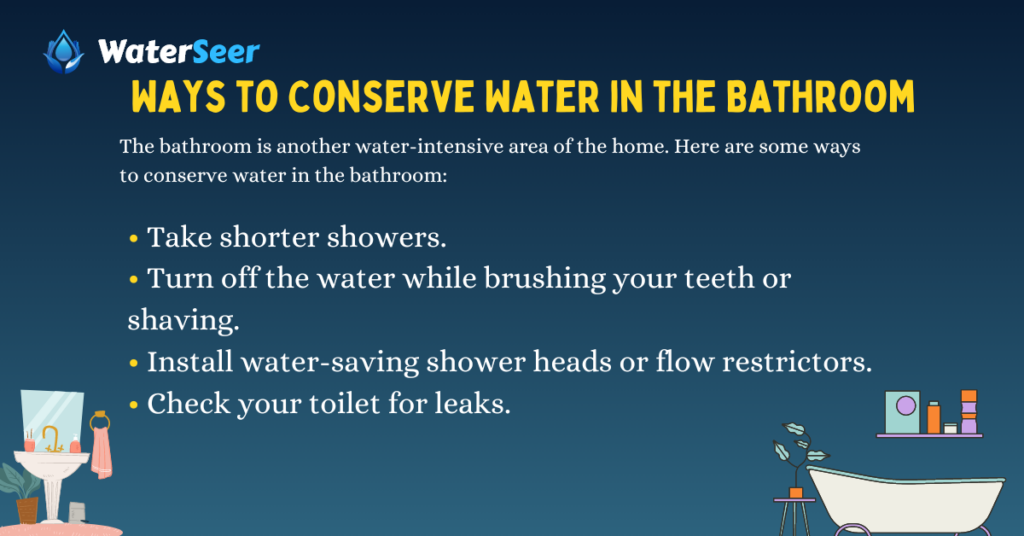By conserving water, you can help reduce demand for national and global water supplies, which is essential for ensuring everyone has access to clean and safe water. The idea of conservation only began to gain popularity in the United States at the end of the 1800s.
Until then, the North American frontier had provided seemingly inexhaustible natural resources, including abundant fresh water.
In 1887, Harriet Strong patented her invention of a system of dams and reservoirs for water storage and flood control. Her system was a series of dams placed so that the water in a lower basin would act as a brace for the dams above and also allowed for the collection of water until needed.
Key Takeaways
- Conserving water at home helps ensure a reliable water supply for future generations. It reduces the carbon footprint associated with water usage.
- You can save money on your water bill and preserve the environment by conserving water.
- Smart ways to conserve water at home include fixing leaks, installing water-efficient appliances, and using water-saving techniques in the yard.
Why is it Important to Conserve Water at Home?
Conserving water at home is an essential practice that everyone should adopt. With the increasing global population and the growing water demand, it is crucial to use this precious resource wisely.
By conserving water, you save money on your water bill and contribute to preserving the environment. This article will discuss smart ways to conserve water at home. Moreover, water conservation can help protect the environment.
Reducing water usage can help preserve aquatic ecosystems and reduce the energy required to treat and transport water. Energy-efficient solutions and appliances can also save your home insurance policy money.
Advantages of Conserving Water at Home

Conserving water at home has numerous advantages, including:
1. Saving Money
Conserving water at home can help you save money. You can significantly reduce water consumption and save money in the long run by implementing simple water-saving techniques, such as fixing leaks, using low-flow showerheads and toilets, and reducing outdoor watering.
2. Preserving the Environment
Conserving water at home also helps to preserve the environment. By reducing water consumption, you can help to save natural resources and protect the environment from the negative impacts of water overuse, such as water scarcity, soil erosion, and habitat destruction.
3. Reducing Energy Consumption
Conserving water at home can also reduce energy consumption. Water treatment and distribution require a significant amount of energy, and by reducing water consumption, you can help to reduce the energy needed to treat and distribute water.
4. Promoting Sustainable Living
Conserving water at home is an essential step toward promoting sustainable living. By implementing water-saving techniques, you can help to reduce your overall environmental footprint and promote a more sustainable way of life.
4 Ways by which You can Save Water at Home
Conserving water at home is good for the environment and helps you save money on your water bill. Here are four ways by which you can save water at home:
1. Ways to Conserve Water in the Kitchen

The kitchen is one of the most water-intensive areas of the home. Here are some ways to conserve water in the kitchen:
- Use your automatic dishwasher for full loads only.
- If you wash dishes by hand, don’t leave the water running for rinsing.
- Don’t let the faucet run while you clean vegetables.
- Keep a bottle of drinking water in the refrigerator.
2. Ways to Conserve Water in the Garage
The garage is an often-overlooked area where water can be conserved. Here are some ways to conserve water in the garage:
- Use a broom to clean driveways, sidewalks, and steps instead of running the hose.
- Don’t run the hose while washing your car.
- Cover swimming pools to reduce evaporation.
3. Ways to Conserve Water in the Bathroom

The bathroom is another water-intensive area of the home. Here are some ways to conserve water in the bathroom:
- Take shorter showers.
- Turn off the water while brushing your teeth or shaving.
- Install water-saving shower heads or flow restrictors.
- Check your toilet for leaks.
4. Ways to Conserve Water in the Garden
The garden is another area where water can be conserved. Here are some ways to conserve water in the garden:
- Water your lawn only when it needs it.
- Plant drought-resistant trees and plants.
- Put a layer of mulch around trees and plants.
- Harvest rainwater for watering vegetable beds.
Following these simple tips, you can help conserve water at home and save money on your water bill.
FAQ’s
How can we save water efficiently?
• Never pour water down the drain when there may be another use for it.
• Make sure your home is leak-free.
• Repair dripping faucets by replacing washers.
• Retrofit all household faucets by installing aerators with flow restrictors.
• Check for toilet leaks by adding food coloring to the tank.
What uses the most water in your house?
The home appliances that use the most water are:
• Toilet – 33 gallons per day.
• Shower – 27 gallons per day.
• Faucet – 27 gallons per day.
• Washing machine – 22 gallons per day.
• Leaks – 18 gallons per day.
• Bath – 4 gallons per day.
• Dishwasher – 2 gallons per day.
What are the 5 methods of conserving water?
• Take a Shower for 5 Minutes or Less.
• Install a Water-saving Toilet Flush System.
• Turn Off the Tap While Brushing Your Teeth & Washing Your Hands.
• Don’t Keep The Tap Running While Washing Clothes/Utensils.
• Close Taps Properly and Fix Leaking Taps, Pipes & Toilets.
Conclusion
By implementing smart ways to conserve water at home, you can significantly reduce water usage and lower your water bill. Conserving water is not only beneficial for your wallet, but it also helps to preserve our planet’s precious resources.
Remember, small changes can make a big difference. Start by fixing leaks, using water-efficient appliances, and being mindful of your water usage. Challenge yourself to take shorter showers, turn off the tap when brushing your teeth, and only run the dishwasher and washing machine when full.
Another great way to conserve water is using rainwater for outdoor activities like watering your garden or washing your car. You can install a rain barrel to collect rainwater from your roof and use it to water your plants.
Finally, remember to spread the word about the importance of water conservation. Encourage your friends and family to adopt these smart water-saving habits, and together we can positively impact our environment.
With these simple and effective tips, you can become a water-saving expert and do your part in preserving our planet’s most valuable resource.

